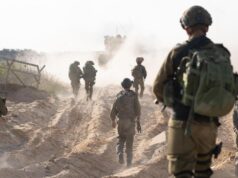A U.S. drone attack on Wednesday on the Afghanistan-Pakistan border killed at least seven Taliban members, including a number of foreign fighters, Reuters reported. U.S. drones have carried out more than 30 strikes over the last year, including 7 under the watch of U.S. President Barack Obama.
Obama, meanwhile, has ordered the deployment of 17,000 more troops to Afghanistan in an effort to stamp out the threat of the Taliban.
Curiously, however, as the war in Afghanistan stretches into its seventh year, the U.S. State Department has not designated the Taliban as a Foreign Terrorist Organization (FTO).
From what is known, the problem may have initially stemmed from the fact that, by law, the State Department could not designate a government. This is no longer a hang-up; the Taliban government that sheltered al-Qaeda and Usama bin Laden from its rise to power in 1996 until its demise in 2001 is now dead and gone. The new organization that has sprouted up in its stead can perhaps be best described as an al-Qaeda “affiliate group.” It remains committed to carrying out a violent jihad against both U.S. servicemen and civilians in Afghanistan, and likely maintains contact with the al-Qaeda and Taliban forces that challenged the U.S. military during Operation Enduring Freedom. However, it no longer enjoys the government infrastructure that housed the Taliban for five years until 2001.
The bigger question at Foggy Bottom is now whether the Taliban should be viewed as a terrorist organization or an insurgency organization. Indeed, language from the 2007 State Department country report on Afghanistan seemed to imply that the Taliban was both.
In fact, the consensus at State is that the Taliban is made up of two factions – one moderate, and another one radical. Or, to put it another way, there may be a Taliban with a capital ‘T’ and a taliban with a lower case ‘t’.
President Obama underscored this notion in a March 8 interview with the New York Times, when he expressed an interest in reaching out to moderate forces among the militants, similar to those that helped bring stability to Iraq. “There may be some comparable opportunities in Afghanistan and in the Pakistani region,” he said.
The Taliban quickly dismissed Obama’s musings as “illogical.” Qari Mohammad Yousuf, a spokesman for the Taliban, insists that the Taliban are “united, have one leader, one aim, one policy.” The group claims that their campaign of violence will not end until the U.S. led forces in Afghanistan are defeated.
Meanwhile, the State Department continues to add less relevant terrorist groups to its FTO list. Peru’s Shining Path or the United Self-Defense Forces of Colombia (two recent additions) have little to do with the broader war on Islamist terror, yet their listings give the sense that they might pose more of a national security threat than the unlisted Taliban.
Designating the Taliban as a Foreign Terrorist Organization is long overdue.
For one, it would demonstrate that the United States views the Taliban as part of a dangerous jihadi network that is undoubtedly terrorist in nature. It is a mistake to allow the world to believe that even parts of the Taliban should be viewed as a legitimate “resistance” organization. A number of American allies, including Great Britain, the European Union, and Australia have followed America’s lead. They have also left the Taliban off their terrorism lists. Most recently, Russia indicated that it would hold talks with “moderate elements” of the Taliban after Obama indicated that he was considering a similar move. A designation would help reverse this dangerous trend.
More importantly, a Taliban designation would also recognize the great work that our military has done in Afghanistan. It would be tantamount to officially relegating the former Taliban government to an affiliate group – the first and only instance in the U.S.-led war on terrorism.
In other words, a designation would relay our belief that the Taliban cannot, under the current circumstances, mount enough strength to retake Afghanistan.
If moderate elements wish to negotiate with the U.S. military or even our diplomatic corps, they should not be allowed to approach the negotiating table as members of the Taliban. If they recognize the defeat of their banned terrorist group, they should be welcomed with open arms.





